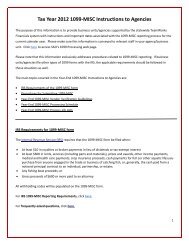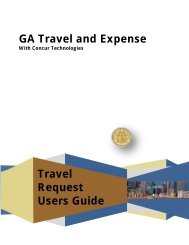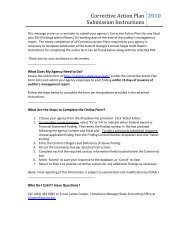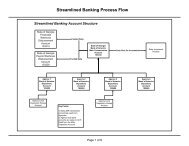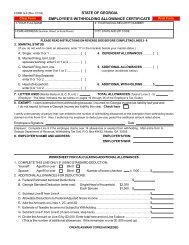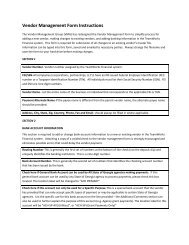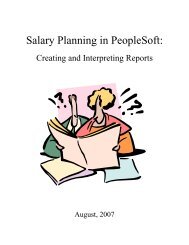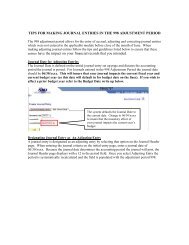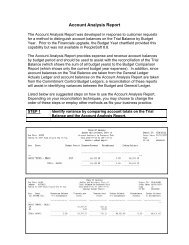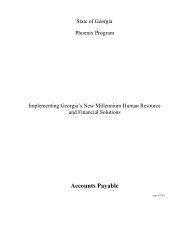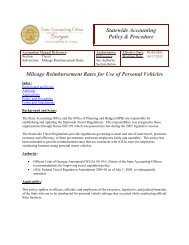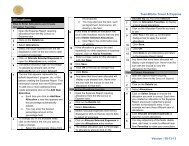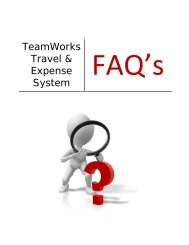- Page 1: Single Audit ReportFiscal Year Ende
- Page 11: Report on Internal Control Over Fin
- Page 14 and 15: Foundation, Incorporated, Georgia T
- Page 16 and 17: Firefighters’ Pension Fund, Georg
- Page 19 and 20: Greg S. GriffinSTATE AUDITOR(404) 6
- Page 21 and 22: In our opinion, based on our audit
- Page 23 and 24: Activities Allowed or UnallowedFA-4
- Page 25: Findings and Questioned Costs
- Page 29 and 30: State of GeorgiaSummary of Auditor
- Page 31: Financial Statement Findings
- Page 34 and 35: State of GeorgiaFinancial Statement
- Page 36 and 37: State of GeorgiaFinancial Statement
- Page 40 and 41: State of GeorgiaFinancial Statement
- Page 42 and 43: State of GeorgiaFinancial Statement
- Page 44 and 45: State of GeorgiaFinancial Statement
- Page 46 and 47: State of GeorgiaFinancial Statement
- Page 48 and 49: State of GeorgiaFinancial Statement
- Page 50 and 51: State of GeorgiaFinancial Statement
- Page 52 and 53: State of GeorgiaFinancial Statement
- Page 54 and 55: State of GeorgiaFinancial Statement
- Page 56 and 57: State of GeorgiaFinancial Statement
- Page 58 and 59: State of GeorgiaFinancial Statement
- Page 60 and 61: State of GeorgiaFinancial Statement
- Page 62 and 63: State of GeorgiaFinancial Statement
- Page 64 and 65: State of GeorgiaFinancial Statement
- Page 69 and 70: State of GeorgiaFinancial Statement
- Page 71 and 72: State of GeorgiaFinancial Statement
- Page 73 and 74: State of GeorgiaFinancial Statement
- Page 75 and 76: State of GeorgiaFinancial Statement
- Page 77 and 78: State of GeorgiaFinancial Statement
- Page 79 and 80: State of GeorgiaFinancial Statement
- Page 81 and 82: State of GeorgiaFinancial Statement
- Page 83 and 84: State of GeorgiaFinancial Statement
- Page 85 and 86: State of GeorgiaFinancial Statement
- Page 87: State of GeorgiaFinancial Statement
- Page 91 and 92:
State of GeorgiaFederal Awards Find
- Page 93 and 94:
State of GeorgiaFederal Awards Find
- Page 95 and 96:
State of GeorgiaFederal Awards Find
- Page 97 and 98:
State of GeorgiaFederal Awards Find
- Page 99 and 100:
State of GeorgiaFederal Awards Find
- Page 101 and 102:
State of GeorgiaFederal Awards Find
- Page 103 and 104:
State of GeorgiaFederal Awards Find
- Page 106 and 107:
State of GeorgiaFederal Awards Find
- Page 108 and 109:
State of GeorgiaFederal Awards Find
- Page 110 and 111:
State of GeorgiaFederal Awards Find
- Page 112 and 113:
State of GeorgiaFederal Awards Find
- Page 114 and 115:
State of GeorgiaFederal Awards Find
- Page 116 and 117:
State of GeorgiaFederal Awards Find
- Page 118 and 119:
State of GeorgiaFederal Awards Find
- Page 120 and 121:
State of GeorgiaFederal Awards Find
- Page 122 and 123:
State of GeorgiaFederal Awards Find
- Page 124 and 125:
State of GeorgiaFederal Awards Find
- Page 126 and 127:
State of GeorgiaFederal Awards Find
- Page 128 and 129:
State of GeorgiaFederal Awards Find
- Page 130 and 131:
State of GeorgiaFederal Awards Find
- Page 132 and 133:
State of GeorgiaFederal Awards Find
- Page 134 and 135:
State of GeorgiaFederal Awards Find
- Page 137:
Expenditures of Federal Awards
- Page 141 and 142:
State of GeorgiaSchedule of Expendi
- Page 143 and 144:
State of GeorgiaSchedule of Expendi
- Page 145 and 146:
State of GeorgiaSchedule of Expendi
- Page 147 and 148:
State of GeorgiaSchedule of Expendi
- Page 149 and 150:
State of GeorgiaSchedule of Expendi
- Page 151 and 152:
State of GeorgiaSchedule of Expendi
- Page 153 and 154:
State of GeorgiaSchedule of Expendi
- Page 155 and 156:
State of GeorgiaSchedule of Expendi
- Page 157 and 158:
State of GeorgiaSchedule of Expendi
- Page 159 and 160:
State of GeorgiaSchedule of Expendi
- Page 161 and 162:
State of GeorgiaSchedule of Expendi
- Page 163 and 164:
State of GeorgiaSchedule of Expendi
- Page 165 and 166:
State of GeorgiaSchedule of Expendi
- Page 167 and 168:
State of GeorgiaSchedule of Expendi
- Page 169 and 170:
State of GeorgiaSchedule of Expendi
- Page 171 and 172:
State of GeorgiaSchedule of Expendi
- Page 173 and 174:
State of GeorgiaSchedule of Expendi
- Page 175 and 176:
State of GeorgiaSchedule of Expendi
- Page 177 and 178:
State of GeorgiaSchedule of Expendi
- Page 179 and 180:
State of GeorgiaSchedule of Expendi
- Page 181 and 182:
State of GeorgiaSchedule of Expendi
- Page 183 and 184:
State of GeorgiaSchedule of Expendi
- Page 185 and 186:
State of GeorgiaSchedule of Expendi
- Page 187 and 188:
State of GeorgiaSchedule of Expendi
- Page 189 and 190:
State of GeorgiaSchedule of Expendi
- Page 191 and 192:
State of GeorgiaSchedule of Expendi
- Page 193 and 194:
State of GeorgiaSchedule of Expendi
- Page 195 and 196:
State of GeorgiaSchedule of Expendi
- Page 197 and 198:
State of GeorgiaSchedule of Expendi
- Page 199 and 200:
State of GeorgiaSchedule of Expendi
- Page 201 and 202:
State of GeorgiaSchedule of Expendi
- Page 203 and 204:
State of GeorgiaSchedule of Expendi
- Page 205 and 206:
State of GeorgiaSchedule of Expendi
- Page 207 and 208:
State of GeorgiaSchedule of Expendi
- Page 209 and 210:
State of GeorgiaSchedule of Expendi
- Page 211 and 212:
State of GeorgiaSchedule of Expendi
- Page 213 and 214:
State of GeorgiaSchedule of Expendi
- Page 215 and 216:
State of GeorgiaSchedule of Expendi
- Page 217 and 218:
State of GeorgiaSchedule of Expendi
- Page 219 and 220:
State of GeorgiaSchedule of Expendi
- Page 221 and 222:
State of GeorgiaSchedule of Expendi
- Page 223 and 224:
State of GeorgiaSchedule of Expendi
- Page 225 and 226:
State of GeorgiaSchedule of Expendi
- Page 227 and 228:
State of GeorgiaSchedule of Expendi
- Page 229 and 230:
State of GeorgiaSchedule of Expendi
- Page 231 and 232:
State of GeorgiaSchedule of Expendi
- Page 233 and 234:
State of GeorgiaSchedule of Expendi
- Page 235 and 236:
State of GeorgiaSchedule of Expendi
- Page 237 and 238:
State of GeorgiaSchedule of Expendi
- Page 239 and 240:
State of GeorgiaSchedule of Expendi
- Page 241 and 242:
State of GeorgiaSchedule of Expendi
- Page 243 and 244:
State of GeorgiaSchedule of Expendi
- Page 245 and 246:
State of GeorgiaSchedule of Expendi
- Page 247 and 248:
State of GeorgiaSchedule of Expendi
- Page 249:
State of GeorgiaSchedule of Expendi
- Page 253 and 254:
State of GeorgiaNotes to the Schedu
- Page 255 and 256:
State of GeorgiaNotes to the Schedu
- Page 257:
State of GeorgiaNotes to the Schedu
- Page 261 and 262:
State of GeorgiaSchedule of Cluster
- Page 263 and 264:
State of GeorgiaSchedule of Cluster
- Page 265 and 266:
State of GeorgiaSchedule of Cluster
- Page 267 and 268:
State of GeorgiaSchedule of Cluster
- Page 269 and 270:
State of GeorgiaSchedule of Cluster
- Page 271 and 272:
State of GeorgiaSchedule of Cluster
- Page 273:
State of GeorgiaSchedule of Cluster
- Page 277:
Summary Schedule of Prior YearFindi
- Page 280 and 281:
State of GeorgiaSummary Schedule of
- Page 282 and 283:
State of GeorgiaSummary Schedule of
- Page 284 and 285:
State of GeorgiaSummary Schedule of
- Page 287 and 288:
State of GeorgiaSchedule of Prior Y
- Page 289 and 290:
State of GeorgiaSchedule of Prior Y
- Page 291 and 292:
State of GeorgiaSchedule of Prior Y
- Page 293 and 294:
State of GeorgiaSchedule of Prior Y
- Page 295 and 296:
State of GeorgiaSchedule of Prior Y
- Page 297 and 298:
State of GeorgiaSchedule of Prior Y
- Page 299 and 300:
State of GeorgiaSchedule of Prior Y
- Page 301:
Corrective Action Responses toCurre
- Page 305 and 306:
State of GeorgiaAuditee’s Correct
- Page 307 and 308:
State of GeorgiaAuditee’s Correct
- Page 309 and 310:
State of GeorgiaAuditee’s Correct
- Page 311 and 312:
State of GeorgiaAuditee’s Correct
- Page 313 and 314:
State of GeorgiaAuditee’s Correct
- Page 315 and 316:
State of GeorgiaAuditee’s Correct
- Page 317 and 318:
State of GeorgiaAuditee’s Correct
- Page 319 and 320:
State of GeorgiaAuditee’s Correct
- Page 321 and 322:
State of GeorgiaAuditee’s Correct
- Page 323 and 324:
State of GeorgiaAuditee’s Correct
- Page 325 and 326:
State of GeorgiaAuditee’s Correct
- Page 327 and 328:
State of GeorgiaAuditee’s Correct
- Page 329 and 330:
State of GeorgiaAuditee’s Correct
- Page 331 and 332:
State of GeorgiaAuditee’s Correct
- Page 333 and 334:
State of GeorgiaAuditee’s Correct
- Page 335 and 336:
State of GeorgiaAuditee’s Correct
- Page 337 and 338:
State of GeorgiaAuditee’s Correct
- Page 339 and 340:
State of GeorgiaAuditee’s Correct
- Page 341 and 342:
State of GeorgiaAuditee’s Correct
- Page 343 and 344:
State of GeorgiaAuditee’s Correct
- Page 345 and 346:
State of GeorgiaAuditee’s Correct
- Page 347 and 348:
State of GeorgiaAuditee’s Correct
- Page 349 and 350:
State of GeorgiaAuditee’s Correct
- Page 351 and 352:
State of GeorgiaAuditee’s Correct
- Page 353:
State of GeorgiaAuditee’s Correct
- Page 357 and 358:
State of GeorgiaListing of Organiza
- Page 359 and 360:
State of GeorgiaListing of Organiza
- Page 361:
State of GeorgiaListing of Organiza



